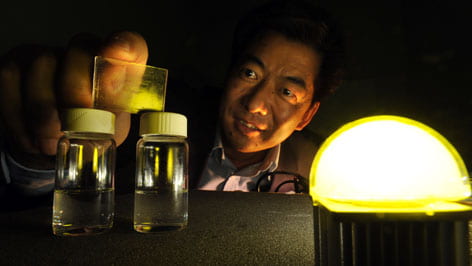Partnering for a urologic care breakthrough
Engineer Frank Shi created a novel silicone product. Urologist Ralph Clayman was looking to create a breakthrough device. A serendipitous partnership between the two has the potential to make a serious dent in the multimillion-dollar urologic care marketplace. It also shows that research collaboration, even between faculty members whose offices are miles apart, will be an important part of UC Irvine’s continued growth.

Frank Shi earned a reputation as a chemical engineering & materials science professor for innovative research on electronic materials and devices like lasers and solar cells, and he never thought his work would have medical applications. But then Dr. Ralph Clayman came calling last year.
The urology professor and chair and interim medical school dean contacted Shi in search of a substance that could revolutionize treatment of urinary tract diseases and injury. Shi’s research team, it turned out, had just the thing – a specially formulated silicone created for optical electronics.
Now this serendipitous partnership is bearing fruit with the potential to make a serious bid for some of the multimillion-dollar urologic device market. It also shows that research collaboration, even between faculty members whose offices are miles apart, will be an important part of UC Irvine’s continued growth.
While urologists use a number of devices in treating patients – stents and catheters, to name just two – these devices must be replaced continually because urine leaves behind mineral deposits that form potentially dangerous and infection-causing clumps.
“The ongoing challenge,” says Clayman, who has designed a number of urologic devices during his career, “is to find a biocompatible substance on which this mineral clumping will not occur, allowing for longer or even permanent use of the device.”
Believing that this new material could be a viable nonstick substance, the duo tested Shi’s novel silicone for its anti-clumping properties and found that items made with it and placed in artificial urine emerged free of mineral deposits – a breakthrough discovery that could help thousands of Americans with bladder diseases or cancers. More so, it points to the potential of what Clayman calls the “home run” of his field – the development of a fully synthetic prosthetic bladder.
UCI has applied for a provisional patent on this silicone product for urologic device use, and Clayman says a major manufacturer is considering licensing it for making urinary stents.
Beyond that, Clayman says his collaboration with Shi is the type needed to discover products that can improve human health. The two were introduced by their mutual friend and colleague, James Earthman, chemical engineering and materials science professor.
“The National Institutes of Health has a strong directive for biomedical research – get it to the patient,” Clayman says. “It’s important that all research faculty members at UCI get together and explore collaboration. It’s our responsibility to advance science, engineering and medicine in every way possible, and collaboration across campus is the best way to achieve results.”